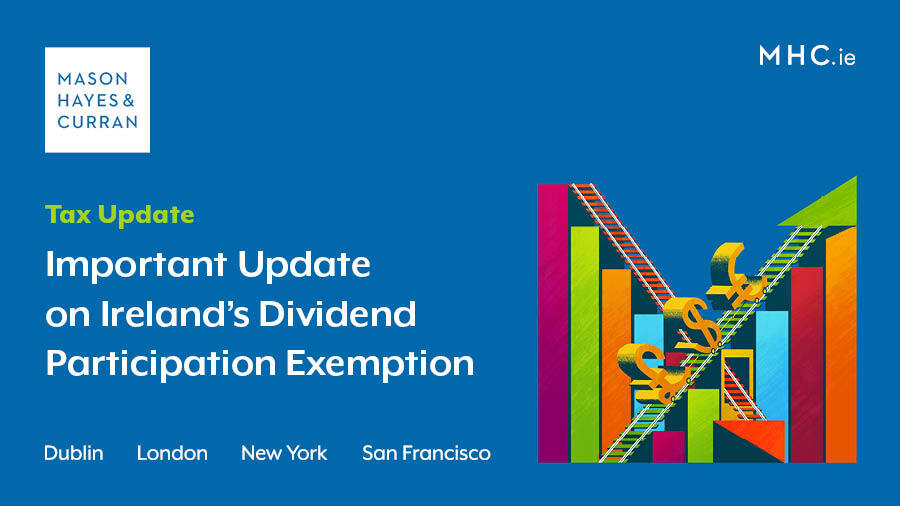Important Update on Ireland’s Dividend Participation Exemption

Ireland's preparation for the introduction of an inbound dividend participation tax exemption continues apace, with an outline proposal published by the Minister for Finance, Michael McGrath TD. Our Tax team considers the proposal.
In an important addition to Ireland’s already attractive holding company regime, the Minister for Finance, Michael McGrath TD, recently published a strawman (outline) proposal for the proposed Irish participation exemption for foreign dividends as part of a public consultation process. Our previous article provides details of the background to this proposal.
The strawman sets out some of the key features of the new participation exemption but notes that readers should not treat these key features as definitive. However, it provides an interesting insight into the Government’s current thinking on the exemption which would provide an optional alternative to Ireland’s existing “tax and credit” regime.
The Minister also reaffirmed the Government’s commitment to the introduction of the regime to come into effect from 1 January 2025.
The current regime for taxation of foreign dividends
Ireland currently has a “tax and credit” system for the foreign dividends received by a company. This means that dividends received are subject to corporation tax in Ireland, but a credit is given for tax paid overseas. While the current system often results in no incremental Irish tax, the rules are complex and can represent an administrative burden for Irish holding companies.
Application of the exemption
A dividend participation exemption would exempt qualifying dividends from corporation tax in the hands of the recipient.
Under the strawman proposal, where the qualifying criteria are satisfied by an Irish recipient company, 100% of any in-scope foreign dividends would be exempt and a foreign tax credit would not be available in respect of these dividends.
The existing tax credit system would continue to apply for foreign dividends that do not qualify for the exemption. This will be of particular relevance to companies receiving dividends from non-EU/EEA jurisdictions or jurisdictions with which Ireland does not have a double taxation agreement.
The exemption would apply to foreign dividends and other types of distributions that represent income from shares or from certain other rights to participate in a company’s profits. The exemption would apply only to income distributions so that capital distributions, for example a distribution in the course of dissolving or winding up a company, would continue to be taxed in accordance with existing capital gains tax rules.
Would the exemption be limited to dividends from certain countries?
The strawman proposal indicates that only dividends received from companies that are resident for tax purposes in the EU/EEA or jurisdictions with which Ireland has a double taxation agreement would qualify for the exemption. These conditions mirror those that apply to qualify for Ireland’s existing capital gains tax participation exemption regime. It is noted in the feedback statement that this is one potential approach. In our view, it is likely to be the subject of further submissions by stakeholders on the basis that:
- For companies within the scope of Pillar Two, no restriction should apply based on the location of the company paying the dividend given that all profits, irrespective of location, are being taxed at a minimum effective rate of 15%.
- For other companies, it might be sufficient to limit the exclusion from the regime to dividends from countries on the EU list of non-cooperative jurisdictions (which is proposed in the statement in any event).
The feedback statement is silent on whether a dividend could be traced through intermediate companies to determine whether it has been paid by a company located for tax purposes in a qualifying jurisdiction and, in our view, this would be an important feature. In addition, the treatment of dividends paid by transparent entities will also require consideration.
Other conditions applying to the paying company
Similar to qualification for Ireland’s capital gains tax participation exemption regime, companies must meet a 5% control test including holding, directly or indirectly, 5% of the ordinary share capital of the foreign company. This shareholding should be held for an uninterrupted period of twelve months up to and including the date of the dividend. Dividends from newly-acquired shareholdings may also qualify provided the shares are held for an overall holding period of twelve months.
While qualification requires a minimum ownership of ordinary shares in the foreign company, where that qualification has been established, the exemption may also apply to dividends received from that company on other types of shares, such as preference shares. This would be subject to anti-avoidance rules.
Optional v mandatory?
It is proposed that companies would have flexibility to opt into the participation exemption regime, with an election to apply for a minimum period of 3 years. This election would operate at the level of the Irish recipient of the dividend and would apply to all potentially in-scope foreign dividends received by that company during the three-year election period.
The existing tax credit system would continue to apply where a company does not opt into the new participation exemption regime.
Anti-avoidance rules
The consultation document notes that the exemption will operate within Ireland’s existing anti-avoidance framework and anti-base erosion (BEPS) measures. However, it is proposed that this would be supplemented with additional anti-avoidance provisions including that the dividend must not be deductible for tax purposes in any other jurisdiction and dividends from countries on the EU list of non-cooperative jurisdictions would not qualify.
Comment
This strawman proposal will be welcomed. While further refinements may be required, it is apparent that feedback received from various stakeholders has been taken into account by the Department of Finance in designing features of the new regime. It is likely that a further consultation document will be published over the summer months with additional details.
In the meantime, the current consultation period will run until 8 May 2024 and clients with questions or comments on the proposal are invited to get in touch with a member of our Tax team to discuss.
People also ask
What is a dividend participation exemption? |
A dividend participation exemption exempts qualifying dividends from corporation tax in the hands of the recipient. |
How are foreign dividends taxed in Ireland? |
Ireland operates a worldwide system of taxation; whereby Irish resident companies are taxed on their worldwide profits. In basic terms, for foreign dividends, there is currently a “tax and credit” system, where dividends received are subject to corporation tax in Ireland but a credit is given for tax paid overseas. |
Does Ireland have a participation exemption? |
Ireland currently has a participation exemption from capital gains where certain conditions are met. Ireland will introduce a participation exemption for foreign dividends with effect from 1 January 2025. The details of this exemption are currently the subject of a government consultation. |
Is Ireland suitable as a holding company location? |
Over recent years Ireland has become a holding company location for some of the world’s leading public and private multinational groups. Ireland’s attractive tax regime for holding companies and its transparent and predictable tax system are key drivers for many organisations in establishing holding companies in Ireland. In addition, Ireland’s EU membership, well-regarded regulatory regime, and sophisticated financial ecosystem provide a unique platform to structure international business in and through Irish corporate vehicles. |
The content of this article is provided for information purposes only and does not constitute legal or other advice.
Share this:




